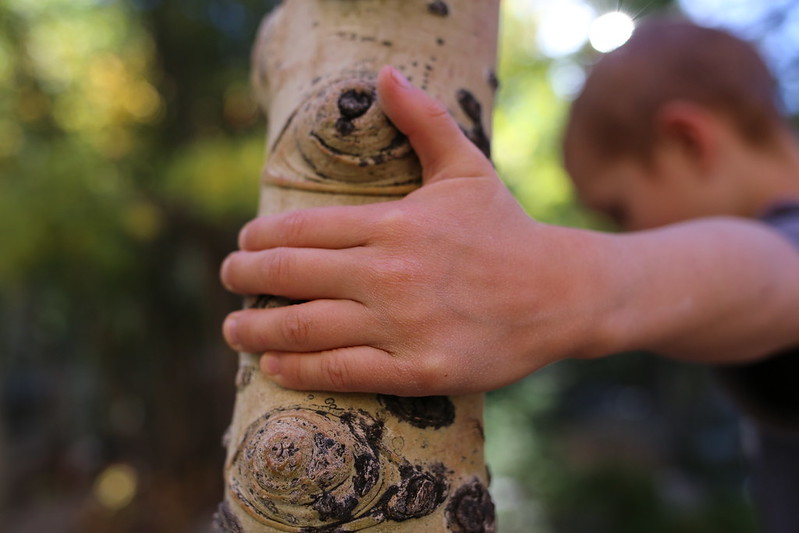
some reflections on the enneagram.
Today let’s talk about the Enneagram.
Why? Because it’s fun!
And because, let’s be honest: you need a break from photos of the Gentino family hiking.
And also it gives us an excuse to remember those glorious, restorative Rocky Mountains from two weeks ago.
Now, before you roll your eyes and skim past this post because writing about the Enneagram on a blog is just too trendy and cliche for you, please hear me out.
I used to feel the same way.
I’ve never been a big fan of personality tests. I’ve been asked to take the Myers-Briggs test several times as an adult, and I know I’m an ISFJ, but I’m not sure that knowledge has done one thing to improve my quality of life. So when multiple bloggers I followed started mentioning the Enneagram tool, I just breezed on past, thinking, That isn’t my thing.
I’d listen to people discuss their numbers on podcast interviews and all the references to “types,” “triads,” and “wings” sounded like a foreign language to me, a language that, frankly, I didn’t care to learn.
But then a year and a half ago, I began seeing a counselor for panic attacks, and before we ever met, she assigned me the Enneagram test as part of the prep work.
I found the results and our following conversations so spot-on in describing my personality, even in shedding light on my battle with anxiety and depression, that I decided to learn more. I bought the book The Road Back to You, by Ian Cron and Suzanne Stabile, read it cover to cover in less than 24 hours, and the rest, they say, is history.
Learning about the Enneagram has indeed improved my quality of life.
So let’s talk about it!
I won’t go into an extensive description here, because there are people who can do it way better than I, but basically: the Enneagram is a personality tool that divides humans into 9 types. Although each of the types might describe us to some extent, everybody most identifies with one of the types. No type is better or worse than the others. Each has tremendous strengths and also some staggering weaknesses.
This is what I find fascinating: we’re all born with a specific personality, but in his book, Ian Cron says that because every human being is wired for survival, our Enneagram type is forged out of the tools for survival we adopted in childhood.
Life is hard. Childhood is hard and scary. Each of us — even those raised in the strongest, most stable of families — unconsciously learned means to “cope and feel safe” based on a combination of the way we were created and the particular life experiences we had, and that method of coping became another layer of our unique personality.
This is a normal part of living as a broken person in a broken world.
Well, as we reach adulthood, these same tools turn into our blind spots. They’ve built up walls that hinder our personal growth and relationships without us even knowing it.
As Cron says, “Now we no longer have a personality; our personality has us! Now, rather than protect our defenseless hearts against the inevitable wounds and losses of childhood, our personalities — which we and others experience as the ways we predictably think, feel, act, react, process information and see the world — limit or imprison us.”
To sum it up, the principle of the Enneagram test is “You are your own worst enemy.”
This is what sets the Enneagram apart from other personality tools. While tests like the Myers-Briggs focus on personality strengths, the Enneagram spends more time exploring its weaknesses.
And that’s why first discovering your number and learning more about it can feel quite depressing.
You read through the list of descriptors of your type and feel utterly exposed and raw.
Or at least I did.
But have no fear! According to teachers of the Enneagram method, this is important work — necessary work, in fact.
David often tells the kids and me that a big part of both healing from wounds and growing in freedom from sin is “bringing what is in darkness into the light.” And that’s what I see as this first step of discovering your number.
Your type was possibly so much in darkness that you didn’t even know it existed! Or, if you’re an intuitive person like me, you’ve lived for years with a vague sense of your particular weaknesses and you despise them, but don’t know how to change.
That’s why, although I was a bit discouraged upon reading my description as an Enneagram 1: The Reformer or Perfectionist, I was mostly vastly relieved. The phrases describing my personality bent put words to struggles that had long lay in the shadowy corners of my consciousness.
I thought, Oh my goodness, someone understands me.
And then, almost immediately after …
Wait, not everyone’s like this!?
Not everyone has this incessant inner voice of self-condemnation?
Not everyone feels agitated or uncomfortable when they try to relax because “there’s too much to be done?”
Not everyone thinks it’s their relentless, pressing-down responsibility to leave the world (and their hotel room, and the National Park restroom) better than they found it?
The very first thing the Enneagram test did was to give me greater understanding of people around me. It was a new awareness that I see the world through a particular lens, and others don’t necessary see the world through that lens. That’s why there’s a good chance that in conversation I’ve asked if you know your Enneagram number. I love getting to know my friends and family better, learning about the lens through which they see the world.
My way is not the right way; it’s just one way.
Strangely, this brings relief.
The Road Back to You describes what your number looks like when you’re in a healthy place, what it looks like in a average place, and what it looks like in an unhealthy place. Each number takes on positive characteristics of a different number in good health, and negative characteristics of another number when unhealthy.
Okay, this is getting complicated, but bear with me.
Once you take the free online quiz (which you may or may not find entirely helpful), be sure to read the type descriptors online or in a concise, practical book like The Road Back to You, and then ask a person close to you for their insight into your number. All these steps are important.
And then your journey can begin!
For now, as an example, I’ll tell you about myself.
I’m an Enneagram 1, which from now on I’ll call The Perfectionist (although doesn’t Reformer sound so much more noble?), with a strong 2: The Helper wing. This means I mostly identify with descriptions of the Perfectionist, but also with some of the Helper.
As an Enneagram 1, I have high expectations of myself and others. I find security in predictable routines, and when things are in their proper place. I’m very concerned with doing the right thing, and not doing the wrong thing. I’m a rule-follower. I can be overly-critical of others. Others perceive me as sounding harsh and critical even when I don’t think I’m being harsh and critical. But what people don’t realize is that I’m most critical of myself.
I don’t take confrontation well, because I spend so much time beating myself up that I can’t bear for someone else to add to that burden. I fear being exposed as a bad person. I’m very responsible and dependable. I work hard to support and help the people around me. I have trouble being vulnerable.
Because I have a 2: The Helper wing, I’m also more extroverted, warm, helpful, and empathetic (some of this sounds contradictory, but that’s okay. We’re all complex beings).
When I’m relaxed and happy, I take on positive characteristics of 7’s: The Enthusiast. I’m spontaneous, fun, flexible, and ready to try new things.
When I’m stressed, I take on unhealthy qualities of 4’s: The Individualist. I become more resentful, more sensitive to criticism, make decisions based on my swinging emotions, and struggle with depression.
There are three triads, or gut-motivators, that each personality falls into, and 1’s are in the anger triad.
Every one of these descriptors describes my natural personality type to a T. Almost eerily so.
Several years ago I would’ve disagreed with being in the anger triad, but a few hard knocks and life experience have shown me the truth: Yep, I have an anger problem.
Some of my friends are surprised to hear me identify so strongly with The Perfectionist, but that’s because I do a good job of covering it up. That’s why, although I’m in the anger triad, many people I know don’t ever see it. We 1’s are so good at controlling ourselves and our negative emotions (because we feel that they’re not “right”) that we keep a tight-lid on our anger, though it eventually manifests itself as “smoldering resentment.”
This is why you should ask someone close to you to confirm your true Enneagram type and your true weaknesses. In our homes with roommates or in our families is where our real colors (and for me, my “smoldering resentment”) surface. This is not meant as condemnation, it’s just a general principle of life.
If we choose to explore this information with those who know us well with an open, humble heart, it can be enormously freeing.
It takes courage to truly discover your Enneagram type and own these “shadow parts” of yourself, as Ian Cron says in his book.
In our natural selves, each of us expends a great deal of energy to keep from seeing — or at least to keep minimizing — our ugly parts. We’re all by nature fiercely defensive, fighting tooth and nail to believe that surely we’re “not as bad as all that.” Or perhaps we do see it and say “This is just who I am, I can’t help it.”
I once heard a podcast episode in which Ian Cron gently probed into a very prominent Christian writer and speaker’s Enneagram type with insightful questions. And for the entire 25-minutes episode, the man “discussed the Enneagram” and also charmingly deflected every single question and didn’t really tell us one real thing about himself or his struggles.
I thought, Wow. This guy has zero idea how defensive and superficial he sounds right now.
But I ought to be slow to judge him. I am every bit as likely to cover up, polish my image, and blame others for my faults. It’s always easier to spot another person’s defensiveness than my own.
The truth is, we all generally prefer to feel misunderstood by people, to believe that we’re victims of our childhood, other people, and of our circumstances.
That’s why not just anybody should explore the Enneagram.
I’d even argue that apart from knowing the saving work and love of Christ, the Enneagram will lead you to despair. Or cynicism.
First, you need to understand something.
Your Enneagram type isn’t just describing your weaknesses or flaws, it’s describing your sin. It’s describing the idols of your heart, the places and habits you turn to find worth, safety, and fulfillment other than the God who created you.
We’re all born sinners. We’re made in the image of God, so there are beautiful parts of our personalities and there are natural limits of our personalities, but from birth we follow in the footsteps of our father, Adam, and so we choose to deny God and excuse our sin. We can try and try but eventually our “true colors” will always show themselves, even if we spend our entire life trying to be a good person.
We can’t be good. There is none righteous, no not one.
We all stand in judgment under a holy, righteous, pure God.
But take heart, dear blog reader.
God came to earth in the flesh in Jesus Christ, and He lived a perfectly righteous life. Jesus resisted his shadow side.
He lifted that terribly heavy burden of trying to be a good person from your shoulders by taking the punishment of your sin on the cross. God raised Him from the dead, and because He has victory over sin and death, if you choose to face your sin and throw yourself on His mercy, you become a new creation.
Did you hear that? In Christ, you have victory over the dark parts of your personality.
And so because you are now and forever free from condemnation and punishment, you can open your eyes wide to your faults.
They are there, they need identifying, but they are not who you are any more! You wear the spotless robes of Christ.
You’re free to spend your energy, as a beloved Bible college professor taught me, “becoming who you already are.” You can take the quiz and read The Road Back to You, and, as you discover yourself, you first stop and worship God, who has known all of this about you from before you were born, long before you knew it, and loved you so tenderly and saved you.
Then, in utter and complete freedom, you can lighten up and even chuckle at the revelation of some of your deepest, darkest weaknesses. Because, “Wow, that is so true of me. Yikes.” You can befriend your inner critic, as Ian Cron urges. You now have the courage to ask your spouse or your family or closest friends, “Do you see this in me? Will you help me on my journey?”
I think far too often we fragile, insecure humans tell ourselves that a good spouse and good friends are the ones who will turn a blind eye to our faults, who “love and accept us anyway.” That’s why we all gravitate toward people who flatter us, and why we flatter others (“you just had a bad day,” “every mom struggles with anger,” “oh, I do that all the time”).
But this is simply not the path of life.
This isn’t the way Christ loves us. His grace does not turn a blind eye; it’s piercing and painful and wonderfully pure. He uses relationships and suffering and mundane daily life to gently but firmly expose our faults — not hide and excuse them — because He wants so much more for us. He wants us to be like Himself, a person from from the prison of faults.
He gives us strength to face what’s in darkness and bring it into the light. And in exchange, He gives us the fruit of His Spirit: love, joy, peace, patience, kindness, goodness, gentleness, and self-control.
We can proceed from a stance of choosing to own our personality and our sin, with eyes of faith that rejoice that He who began this good work in us will be faithful to complete it. We can work hard to change here and now so that we can live an abundant, joyful life and love others more deeply. We can find real friends to cheer us on in that journey.
And we also live daily in hope that one day we will feast together in the house of Zion with our hearts and personalities fully restored to the people God created us to be.
So. How to even begin?
Well, as a Perfectionist, who’s not naturally transparent, I start small by beginning to practice the language of the Enneagram with my husband.
I let him read my descriptors and give him insights into real-life examples of those struggles, so that he can help speak into them.
Not just “I struggle with anxiety,” but “I spend a lot of time comparing myself to others, and find that I end up either judging them or judging myself. It makes me paranoid and anxious and weary. I wish I could rest secure in what God thinks of me, and have the eyes to see people the way He sees them.”
I give David permission, by opening this part of my heart to him, to gently say at times, “Julie, I think you’re caught up in listening to your inner critic right now rather than believing what’s true,” or “You are over-correcting our kids today.”
This is good. This is Christian accountability.
Real vulnerability is contagious. David now feels safe to do the same with me, to explore the shadow sides of his personality and ask me to walk with him on his own journey to freedom.
We still speak this language imperfectly, in fits and starts. But we are committed to learning it together.
And the pure, shining moments that I treasure up in my heart are when he stops to say, “Wow, you were compassionate with our son just now, rather than reacting to him in frustration,” or “When I told you about the way you hurt me, I could tell you were less defensive and willing to really listen to me. Thank you.”
Hearing those life-giving words of Christ’s work in my life is one of the most bolstering and inspiring things I know. It gives me the courage to press on in this journey of sanctification.
I hope that you’ll be inspired to do the same!


















